The news is coming out of 3GSM thick and fast, so we’re going to be reporting in a slightly different way. When we see a press release that we think it’s of interest to you, Dear Reader, we’ll put it up in full, with a brief comment at the top. Normal service will be resumed post 3GSM – unless you tell us you like this format.
We’re increasingly disappointed about the view of a couple of technologies by the wider market. The primary recipients of over-glowing acceptance in our view are Apple with their iPod and Google with search. OK, they’re good products, but really …. have some imagination. There are other products/services around that are equally good, and we’re sure that it’s only a matter of time before the alternatives exceed what is currently seen as the benchmark.
To fit in with this trend, Vodafone (who for goodness sake should have more confidence and technical expertise) have signed with Google, to have them power search on the Vodafone network.
Vodafone and Google team to create innovative mobile search experience for mobile phone users
Vodafone today announced that it is collaborating with Google todevelop innovative mobile search services for its customers.
Vodafone will integrate Google’s search capability into its consumerservice, Vodafone live!, providing customers with the most relevantinformation, wherever they are and whatever time of day it is.
Google’s search results will be delivered through Vodafone’s high speeddata networks. Combining Vodafone’s mobile expertise with Google’ssearch capability will ensure that customers can quickly and easilyfind what’s relevant to them. The new service will offer simultaneoussearch both on Vodafone live! and the wider Web.
Vodafone’s integration of Google search will take the mobile internetto a new level. Vodafone live! was the first mobile service to makedata services easily accessible to mobile customers. Whether checkingthe weather, looking for a restaurant or getting the most up-to-datenews, consumers want search services that meet their everyday needs.
Alan Harper, Group Strategy Director, Vodafone, said: “Innovative mobile search will become increasingly important as fastand easy access to information and services are increasingly demandedby customers on the move. Together, Vodafone and Google will focus oncreating the best mobile search service in the market, helping to bringthe mobile internet to life. Our customers will be able to findrelevant information and services faster, making the Vodafone live!customer experience even better. Our intention is to develop ourrelationship with Google to ensure Vodafone customers continue to havethe very best in mobile services.”
Nikesh Arora, Vice President, European Operations, Google Inc., said: “As people become more mobile, it’s increasingly important that we canprovide them with access to information when on-the-go. Googleunderstands that mobile phone users are looking for more than a desktopreplacement – they want directly relevant content, quickly. Vodafonehas long been a pioneer in providing mobile data services to itscustomers and we believe that by working together we will ensure a userfriendly experience for mobile users.”
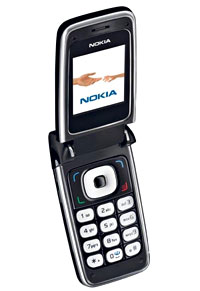 Launched at the 3GSM World Congress in Barcelona, Nokia’s new 6136 phone is being touted as the handset that brings GSM and wireless LANs together.
Launched at the 3GSM World Congress in Barcelona, Nokia’s new 6136 phone is being touted as the handset that brings GSM and wireless LANs together.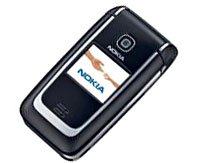 The quad-band Nokia 6136 will be able to connect to GSM networks at 850, 900, 1800, and 1900MHz (so no problems using it in the States as well as Europe) and comes with a built in 1.3 megapixel camera and FM radio.
The quad-band Nokia 6136 will be able to connect to GSM networks at 850, 900, 1800, and 1900MHz (so no problems using it in the States as well as Europe) and comes with a built in 1.3 megapixel camera and FM radio.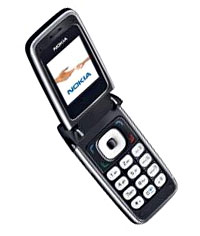 At a press conference on Monday, Jorma Ollila, Nokia’s chief executive said, “We want to help our customers complement their existing mobile services with mobile IP. UMA gives users an alternative to PC-based VoIP,”
At a press conference on Monday, Jorma Ollila, Nokia’s chief executive said, “We want to help our customers complement their existing mobile services with mobile IP. UMA gives users an alternative to PC-based VoIP,” Internet big boys Google and Skype have teamed up with two venture capital firms, Index Ventures and Sequoia Capital, to invest a mighty wedge into Fon Technology, a Spanish startup looking to build a global network of Wi-Fi hotspots.
Internet big boys Google and Skype have teamed up with two venture capital firms, Index Ventures and Sequoia Capital, to invest a mighty wedge into Fon Technology, a Spanish startup looking to build a global network of Wi-Fi hotspots.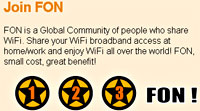 For Google and Skype, a deal with FON makes their web-based services more ubiquitously available, with developers gaining access to a new platform for creating and delivering services on a global scale.
For Google and Skype, a deal with FON makes their web-based services more ubiquitously available, with developers gaining access to a new platform for creating and delivering services on a global scale.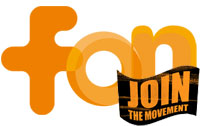 “As we continue to grow, we will attract consumers for all three foneros categories and achieve our goal of creating a global WiFi nation. This is a great opportunity for ISP’s, bloggers, developers, early adopters, consumer electronics manufacturers and the ‘average Joe or Jane’ with a WiFi connection to make money by letting other foneros connect to the Net safely and simply,” he continued.
“As we continue to grow, we will attract consumers for all three foneros categories and achieve our goal of creating a global WiFi nation. This is a great opportunity for ISP’s, bloggers, developers, early adopters, consumer electronics manufacturers and the ‘average Joe or Jane’ with a WiFi connection to make money by letting other foneros connect to the Net safely and simply,” he continued. How do ‘Normal’ phones work?
How do ‘Normal’ phones work? VoIP in an ideal world
VoIP in an ideal world Security implications and therefore costs are a significant issue. The increase in network traffic that VoIP can bring can have other cost implications, such as ensuring firewalls are “chunky” enough to support the VoIP traffic.
Security implications and therefore costs are a significant issue. The increase in network traffic that VoIP can bring can have other cost implications, such as ensuring firewalls are “chunky” enough to support the VoIP traffic. Looking for new sources of revenue beyond their Internet telephony service, Skype have announced a deal with Warner Music Group to flog ring tones and artist images.
Looking for new sources of revenue beyond their Internet telephony service, Skype have announced a deal with Warner Music Group to flog ring tones and artist images. “We are excited that more than 70m Skype users around the world will now have the ability to enjoy content from Warner Music artists,” said Alex Zubillaga, executive vice-president in charge of digital strategy and business development at Warner Music (that’s some job title – we wonder if he meets people saying, “Hi, I’m Alex Zubillaga, EVPICODSABD at Warners?”)
“We are excited that more than 70m Skype users around the world will now have the ability to enjoy content from Warner Music artists,” said Alex Zubillaga, executive vice-president in charge of digital strategy and business development at Warner Music (that’s some job title – we wonder if he meets people saying, “Hi, I’m Alex Zubillaga, EVPICODSABD at Warners?”) Ringtone sales have proved a surprise hit for mobile operators and content providers, coining in an astonishing $4bn in worldwide sales in 2004 – around 10 per cent of the $32.2bn worldwide music market.
Ringtone sales have proved a surprise hit for mobile operators and content providers, coining in an astonishing $4bn in worldwide sales in 2004 – around 10 per cent of the $32.2bn worldwide music market. Google have released version 4 of their popular toolbar for Web browsers, with groovy new features to lure more visitors to their sites.
Google have released version 4 of their popular toolbar for Web browsers, with groovy new features to lure more visitors to their sites. The Bookmarks functionality has also been enhanced to allow users to create and label bookmarks that can be accessed from any computer – something noticeable missing from arch-rival Internet Explorer.
The Bookmarks functionality has also been enhanced to allow users to create and label bookmarks that can be accessed from any computer – something noticeable missing from arch-rival Internet Explorer. By ramping up the feature set Google is hoping to grab a larger share of Web users (and thus more advertisers) and steal a march on Yahoo and Microsoft who both offer their own toolbars.
By ramping up the feature set Google is hoping to grab a larger share of Web users (and thus more advertisers) and steal a march on Yahoo and Microsoft who both offer their own toolbars. BT’s dominance of the UK home telephone is coming under fresh pressure as the phone call market becomes the most liberal in Europe. Previously, their pricing levels have had to be agreed in advance with the UK regulator Ofcom, but with it understood that this is going to be lifted soon, price cuts are expected.
BT’s dominance of the UK home telephone is coming under fresh pressure as the phone call market becomes the most liberal in Europe. Previously, their pricing levels have had to be agreed in advance with the UK regulator Ofcom, but with it understood that this is going to be lifted soon, price cuts are expected. Technical-savvy Skype callers have for a long time taken advantage of VoIP calling to obtain free or cheap calls.
Technical-savvy Skype callers have for a long time taken advantage of VoIP calling to obtain free or cheap calls.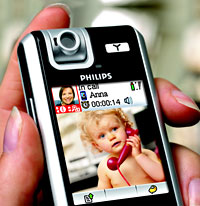 It’s been a long time coming, but Dutch enormo-corp Philips are looking set to finally roll out their innovative Wi-Fi-enabled VoIP telephone, the VP-5500.
It’s been a long time coming, but Dutch enormo-corp Philips are looking set to finally roll out their innovative Wi-Fi-enabled VoIP telephone, the VP-5500. Announced way back in Sept 2005, the VoIP phone comes with a VGA camera that rotates up to 240 degrees, letting users check out their look on the built-in, high-resolution LCD display before committing a potential videocall fashion catastrophe.
Announced way back in Sept 2005, the VoIP phone comes with a VGA camera that rotates up to 240 degrees, letting users check out their look on the built-in, high-resolution LCD display before committing a potential videocall fashion catastrophe. Built around established standards-based technologies like Wi-Fi and Linux, the VP5500 can be upgraded wirelessly, opening the door to future upgrades – giving operators the chance to add value-added services as the becmoe available.
Built around established standards-based technologies like Wi-Fi and Linux, the VP5500 can be upgraded wirelessly, opening the door to future upgrades – giving operators the chance to add value-added services as the becmoe available. To be honest, we’re still a little unsure about video calling.
To be honest, we’re still a little unsure about video calling.